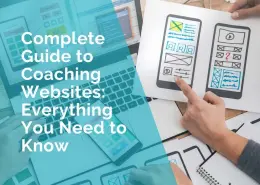How to Be Successful Online – 6 Things You Need To Consider
Whether you are creating your first website or wanting to improve an existing one, use this checklist to ensure the success of your business online.
1. Domain Name
Register a domain name that has keywords related to your business. Even if your business name is John Smith & Sons, registering a domain name with just the name is not going to help your business from a search engine point of view. Try including some keywords, for example: Johnsmithplumbing.com or yourcityplumbing.com. You can always register additional domain names with your business name or product names to protect your brand and identity but, for the main domain name, make sure you have some keywords included. This will help with search engine optimization later on.
2. Research Keywords
Before you start putting together copy for your website, research which keywords people are using to find your business, products or service online. Remember, you want to find keywords that are searched often, but haven’t been used to optimize many websites.
There are two kinds of keywords: “research” keywords and “buying” keywords.
People use research keywords when they are researching a product or a service. For example, someone looking to buy a car, would start with broad searches, such as “family car” or “sports car,” next they may narrow it down to the brand, for example, “Toyota” or “Porsche.” At this point, visitors are still researching.
It is only when they start looking at keywords such as “Toyota Corolla Ascent” or “Porsche Boxster 987” that they are ready to buy. As such, you want to have your site optimized for keywords that people are using when they are in a buying frame of mind.
Two great tools you can use for researching keywords include: Google Keyword Suggestion Tool and Wordtracker.
3. Original and Relevant Content
Include as much information as possible about each product and service you offer. When people are looking online, they want the details right then. They don’t want to wait until they can talk to you on the phone or e-mail you. If your site doesn’t answer their questions and provide them with all the data they require, they will go somewhere else.
Search engines love original content, so in order to be successful online make sure you write your own text. Never copy from someone else’s website – search engines will pick up that it is duplicate content and may penalize you for it, not to mention you may be breaching copyright laws.
Pages to include on your website are:
• Home
• Products / Services
• Pricing
• Frequently Asked Questions
• Contact Us
• Testimonials
• Product Reviews
• Photo Gallery / Portfolio
• About Us
• Resources
• Guarantee
• Return / Refund Policy
• Survey
• Privacy Policy
• Site Map
• Links
• Media Information
• Blog
• Awards / Achievements
• Online Store
• Videos
• Social Media Networks
• Associations
• Qualifications
4. Website Credibility
Credibility is a big problem for many online businesses, especially if the products, services and brands are not well known in the marketplace. Lack of trust is one of the main reasons visitors don’t convert into paying customers. The good news is, there are several things you can do to prove your credibility:
• Include testimonials and product reviews from happy customers.
• Provide as many contact details as possible.
• Show before and after shots.
• Offer a money-back guarantee.
• Spell out your privacy policy.
• List details of any reputable trade associations you belong to.
• Include useful/relevant information, so you are viewed as an expert in your field.
• Add any media articles that have been written about your business, both online and offline.
• Include ‘About Us’ info such as business hours, qualifications and photos of your staff.
• Provide details of any awards you have won.
• List community projects and charities you are involved in.
5. Social Interaction
More and more people are using social media networks such as Facebook, Twitter, LinkedIn and Google+ to interact with their family, friends and business associates or clients. It is important you get involved too. Set up a Facebook business page and create a Twitter account or a LinkedIn profile. The more you interact with your customers, the more they will trust you.
Don’t sell via social networks. Instead, provide useful tips and industry news and build relationships which, if done correctly, will lead to many future sales.
Search engines also take note of your social network participation and the more they see people are interacting with you, the more they will perceive you as the “go-to” authority on your subject and will reward you with higher rankings.
6. Call to Action
You need to be very clear about what you want your visitors to do when they land on one of your pages. Do you want them to call you or click through to another page for more details, or perhaps request a quote? Make sure your call to action is listed on all your pages, as visitors will not always arrive at your website via your homepage.
Don’t forget, more than 98 percent of visitors will not buy from you on their first visit. As such, it is important to collect their contact details by offering them something for free: an article, a report, a special offer or a sample.
Creating a successful website takes a bit of planning and preparation. It is not as simple as taking a few pictures and writing a bit of text and uploading them online. The good news is, if you do a bit of homework upfront, register the right domain name, include appropriate keywords, write original content and prove your credibility, you have a much better chance of not only ranking higher in search engines, but also converting visitors into customers.
****
by Ivana Katz
Websites 4 Small Business – www.web4business.com.au















